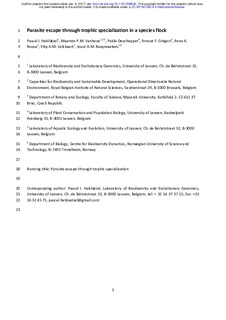| dc.contributor.author | Hablützel, PI | |
| dc.contributor.author | Vanhove, MPM | |
| dc.contributor.author | Deschepper, P | |
| dc.contributor.author | Gregoir, AF | |
| dc.contributor.author | Roose, AK | |
| dc.contributor.author | Volckaert, FAM | |
| dc.contributor.author | Raeymaekers, Joost A. M. | |
| dc.date.accessioned | 2018-04-05T06:18:43Z | |
| dc.date.available | 2018-04-05T06:18:43Z | |
| dc.date.created | 2017-09-18T10:22:57Z | |
| dc.date.issued | 2017 | |
| dc.identifier.citation | Journal of Evolutionary Biology. 2017, 30 (7), 1437-1445. | nb_NO |
| dc.identifier.issn | 1010-061X | |
| dc.identifier.uri | http://hdl.handle.net/11250/2492688 | |
| dc.description.abstract | Adaptive radiation occurs when species diversify rapidly to occupy an array of ecological niches. As opportunities for parasite infection and transmission may greatly vary among these niches, adaptive radiation is expected to be associated with a turnover of the parasite community. As major agents of natural and sexual selection, parasites may play a central role in host diversification. The study of parasite turnover may thus be of general relevance and could significantly improve our understanding of adaptive radiation. In this study, we examined the parasite faunas of eleven species belonging to the tribe Tropheini, one of several adaptive radiations of cichlid fishes in Lake Tanganyika. The most parsimonious ancestral foraging strategy among the Tropheini is relatively unselective substrate browsing of aufwuchs. Several lineages evolved more specialized foraging strategies, such as selective combing of microscopic diatoms or picking of macro‐invertebrates. We found that representatives of these specialized lineages bear reduced infection with food‐web‐transmitted acanthocephalan helminths, but not with parasites with a direct life cycle. Possibly, the evolution of selective foraging strategies entailed reduced ingestion of intermediate invertebrate hosts of acanthocephalans. We conclude that some species belonging to the Tropheini virtually escape acanthocephalan infection as a by‐product of trophic specialization. | nb_NO |
| dc.language.iso | eng | nb_NO |
| dc.publisher | Wiley | nb_NO |
| dc.title | Parasite escape through trophic specialization in a species flock | nb_NO |
| dc.type | Journal article | nb_NO |
| dc.description.version | submittedVersion | nb_NO |
| dc.source.pagenumber | 1437-1445 | nb_NO |
| dc.source.volume | 30 | nb_NO |
| dc.source.journal | Journal of Evolutionary Biology | nb_NO |
| dc.source.issue | 7 | nb_NO |
| dc.identifier.doi | 10.1111/jeb.13111 | |
| dc.identifier.cristin | 1494652 | |
| dc.description.localcode | This is the pre-peer reviewed version of the following article: [Parasite escape through trophic specialization in a species flock], which has been published in final form at [https://onlinelibrary.wiley.com/doi/abs/10.1111/jeb.13111]. This article may be used for non-commercial purposes in accordance with Wiley Terms and Conditions for Self-Archiving. | nb_NO |
| cristin.unitcode | 194,66,10,0 | |
| cristin.unitname | Institutt for biologi | |
| cristin.ispublished | true | |
| cristin.fulltext | preprint | |
| cristin.qualitycode | 1 | |
